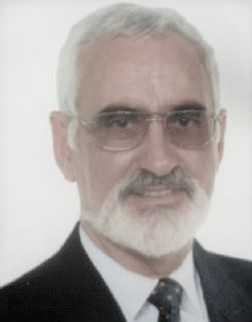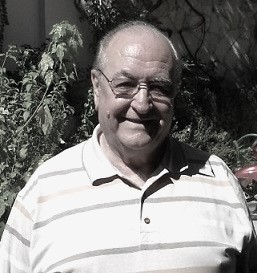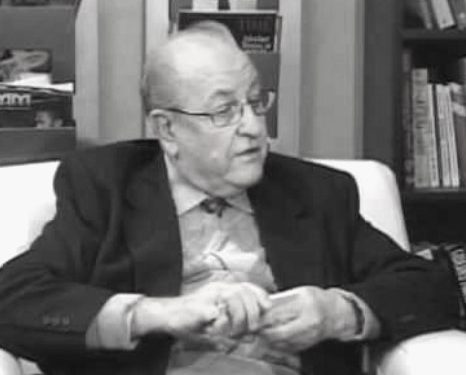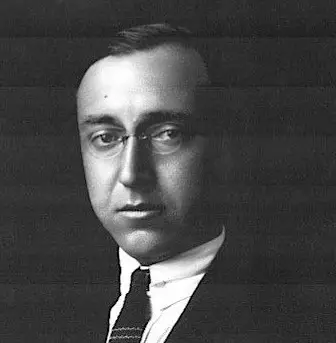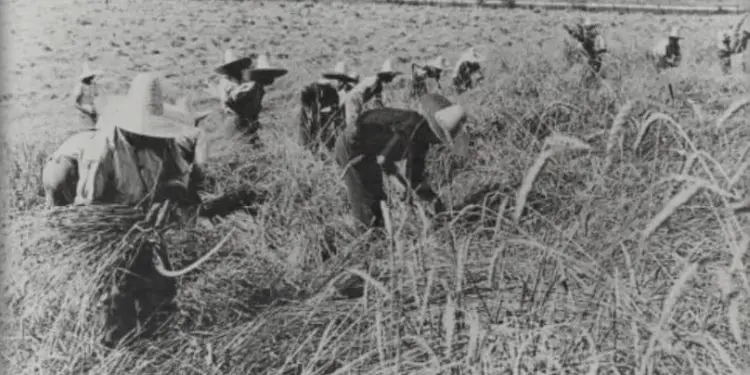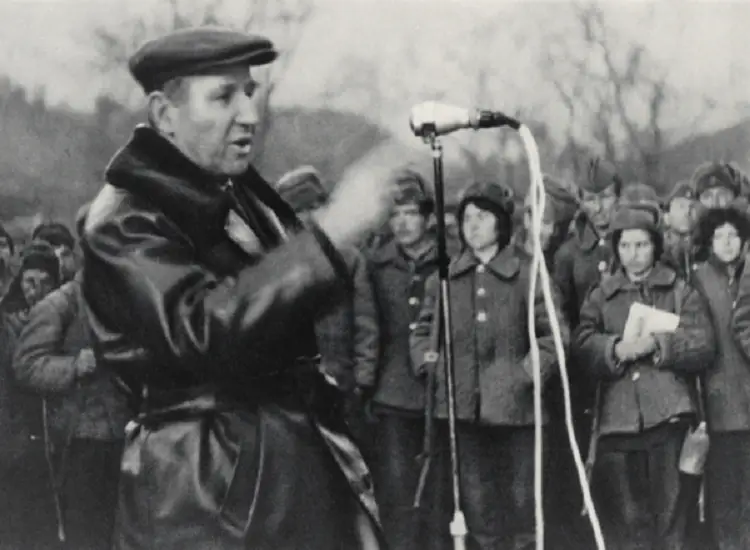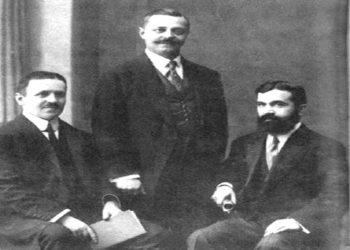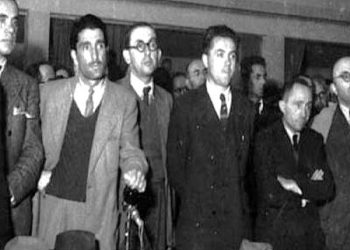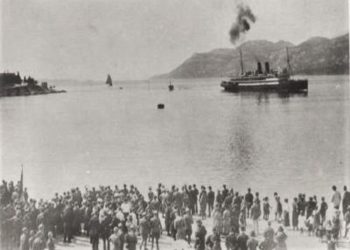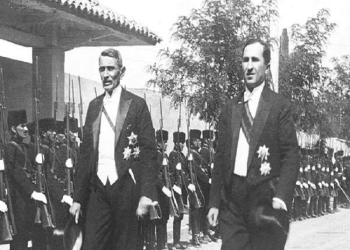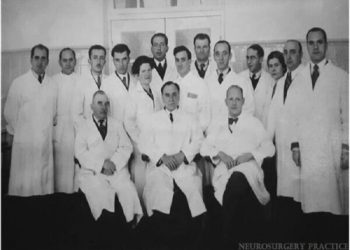By Thanas L. Gjika
Part One
– Essay on the analyst, Eng. Mërgim Korça –
Memorie.al / Eng. Mërgim Korça, in Albanian letters, is one of the truly free analysts of the post-communist period, who with his works has expanded and expands the horizon of readers, has opened and continues to open new avenues for solving problems left pending before our society, yesterday and today. He has written many articles in various forums and newspapers, most of which he has also published in three well-received collections: Histori të Pashkruara (Unwritten Stories) (268 pp, 2005), Hedhje Drite Rreth Shtrembërimesh Historike (Shedding Light on Historical Distortions) (247 pp, 2008), and Çështja Kolaboracionizëm e të tjera, t’i Gjykojmë (The Issue of Collaborationism and Others, Let’s Judge Them) (515 pp, 2014).
He has also conducted various conversations and interviews on TV Michigan, presented papers at scientific sessions, and produced several DVDs with interviews conducted by him, with Mr. Seit Demneri, a former classmate of Ramiz Alia at the Tirana gymnasium, etc. In these works, persistent efforts are made to clarify the fact of what the morality and patriotism were of the main figures of the Albanian Anti-Fascist War and the leaders of the Albanian communist regime in the years 1944-1992. The fundamental lesson transmitted by this analyst’s writings, their motto, is: Immoral politicians and historians have been and are harmful.
Prominent writers, such as Professor Ardian Ndreca, the distinguished writer Visar Zhiti, and others, have written about Mërgim’s value as an analyst. The talented engineer Mërgim Korça is the youngest son of Dr. Xhevat Korça (1893–1959), an intellectual and patriot who is yet to be fully appreciated. Xhevat, after finishing gymnasium in Ioannina in 1911, joined the mountains as a komit (guerrilla fighter) with the detachments of our National Renaissance of Themistokli Gërmenji and Spiro Bellkameni.
In 1917, he was sent to study in Austria, where in 1922; he received his doctorate with a study on the life and values of Gjergj Kastrioti Skanderbeg, constructed as an answer to three questions. After returning to the homeland, a few months later, he was sent by the Albanian government to found the State Gymnasium of Shkodër, a job he successfully completed.
In 1925, he left Albania as an anti-Zogist, and that same year, Prof. Barich appointed him a lecturer at the University of Belgrade. In 1928, after Ahmet Zogu sent people there twice to assassinate him, he left Belgrade and went to Austria, where he lived as an emigrant until 1936, and the year he moved with his entire family to Fiume, Italy. In August 1939, he returned to the homeland, and when his friend Mustafa Merlika Kruja invited him to become Minister of Education, Xhevat accepted after his request was approved to remove the Italian language from all primary schools in Albania, as well as to release from prison and internment in Italy all teachers convicted as anti-Italians.
On November 17, 1944, communist forces arrested Xhevat along with his eldest son, labeling him; “pro-fascist, enemy of the people.” In April 1945, along with many other convicts, he was brought before the ‘Special Court’ with Koçi Xoxe as the chairman of the judging panel and Bedri Spahiu as the prosecutor, who in his claim sought the death penalty by firing squad for Xhevat Korça, as a fascist.
In his final address, Xhevat Korça, addressing the chairman of the judging panel, said: “Mr. Chairman, do not listen to what the prosecutor says. I tell you: Find one publicly spoken word in favor of fascism, or one sentence written as such, and execute me by firing squad!”
The courageous defense that Xhevat Korça made for himself forced the judging panel to change the sentence from death to life imprisonment. In August 1959, to express his protest against the unjust sentence he had been given and against the miserable condition of the prisoners of Burrel, Xhevat Korça ended his life with a hunger strike, a rare, if not the only, case until then in the prisons of the communist bloc.
His contribution to the field of letters is still unknown. The beginnings of his writings are documented in the magazine Djalëria (Youth) published by Albanian students in Austria. But these writings, as well as others published in other press organs, have not been collected. Without a doubt, all the documentation obtained from various European archives, translated by him and titled; ‘Akte dhe dokumenta Austro – Hungare lidhur me Shqipërinë’ (Austro-Hungarian Acts and Documents related to Albania), is of great importance. Xhevat Korça also translated from German the work of the American John Reed, ’10 Ditë që tronditën Botën’ (10 Days That Shook the World) (German: ’10 Tage Die Die Welt Erschutterten’).
The eldest son, Genci, was born in Shkodër in 1924 and was forced to take the road of emigration as an infant, along with his father and mother. This emigrant boy began his education in Austrian and Italian schools, until 1943, where he finished his first year of medicine, returned for the summer holidays, and remained in Albania. Genci’s dream was to finish his medical studies, but he could not realize it due to circumstances.
On November 17, 1944, he was arrested along with his father and was released, due to lack of evidence, after 13 months, without being convicted by any judicial process. He worked to support his family as an assistant doctor in Shkodër, but after about a year, he was sent to work in the mountainous area of Dukagjin, where he connected with some anti-communist patriots, with whom, after various vicissitudes, he managed to escape to Yugoslavia in October 1952.
After a few months, he managed to escape from Yugoslavia to Austria, and from there, he went to Greece, from where in 1955, he went to the USA. Here he continued his education at Wayne State University, Detroit MI, in the Industrial Chemistry department, specializing in Industrial Hygiene. For his high student results, he was given a University symbol, as the most excellent student of the year. He lectured there for several years. Furthermore, he worked as an engineer for the American industrial giant, “General Motors Detroit MI,” where for the last 13 years until his retirement; he was Director of Industrial Hygiene for the entire “General Motors” Corporation.
In [1998, or a year after – the year is missing in the text], Genci published the volume of memoirs in English, “One Man’s Journey to Freedom”, which was also reviewed in English, in the newspaper Dielli (The Sun), by Dr. Gjon Buçaj, the chairman of the “Vatra” Society. This work is engaging for its simple narration of the vicissitudes that the young man and the man Genc went through, in emigration and in the homeland and again in emigration. He married in 1958, with Ms. Margaret, and today has two sons and one daughter and eight grandchildren, a complete “bee,” as we say in Albania.
From the trio of the elite Korça family, the youngest son of the family, Mërgim, to whom I dedicate this short essay, shines in a special way. Since his early youth, he was forced to work and study to survive honorably and to care for his mother, the great sufferer of the family. This lady was one of the few brave ones who voted against the regime in the 1945 elections, casting the sphere (vote) into the box of the “enemy,” a box not lined with velvet, which caused a stir and the revelation of the secret of the vote against…!
Mërgim “drank” the full cup of sorrows during the dictatorship, and after its disintegration, he adapted beautifully in the new homeland, in the USA, where alongside paid work to secure a living for himself and his family, he began his struggle as an intellectual, with distinguished civic feelings, to clarify the negative character of the Albanian dictatorship and its political and scientific personalities.
Mërgim, as his name suggests (Mërgim means “Exile/Emigration”), was born abroad, on November 30, 1932, when his family was in exile in Graz, Austria. In the years of the dictatorship, as the son of a convict branded as an “enemy of the people” and the brother of an escapee, i.e., due to his biography, Mërgim was not given the right to pursue higher education.
However, taking advantage of a “lull” in the class struggle, as well as the support given by the Road-Bridge Enterprise (Ndërmarrja Rruga-Ura), where he worked, he was able to pursue studies in Mechanical Engineering, through courses without interruption from work (evening courses), nine years after finishing high school.
Mërgim managed not only to survive but also to impose himself on the dictatorial government, which was very dependent on agricultural mechanization. He achieved these successes through his intensive and persistent work, designing and implementing original projects for agricultural machinery, where his talent as a mechanical designer and constructor stood out.
The machines designed and created by Eng. Korça became very well known, such as the machine for cotton thinning (for which Enver Hoxha himself had ordered the leaders of the Lushnjë and Fier districts that they absolutely had to solve that problem, tasking the most capable engineers for that job, because the textile industry was forced to import large quantities of cotton, due to the very low yield of cotton production).
Eng. Korça conceptualized, designed, and built the unit for land drainage, with mechanized tunnel opening, with a diameter of 10 cm, at a depth of 70 cm from the soil surface, and automatically filled with washed and fractionated gravel, instead of ceramic pipes.
The implementation of this drainage method reduced the cost of drainage tenfold compared to installing ceramic pipes. It also accelerated this process, from one hectare drained by a brigade of 10 people in one month, to four hectares a day, when carried out with this mechanism.
Also, Eng. Mërgim Korça designed and built another machine for opening drainage ditches, which the former Prime Minister Mehmet Shehu had been asking the Agricultural Mechanics Factories for years. This was because the imported machinery available to the S.M.T.s and Agricultural Farms opened the drainage ditch with a surface width of over one meter.
Based on this fact, the Prime Minister had given the First Secretary of the Lushnjë Party Committee, Lenka Çuko, a sketch with an order to give it to Eng. Korça, where he requested the dimensions of the drainage ditch to be 45 cm on the field surface, 45 cm deep, and the base width of the ditch to be 10 cm. The commissioning of this machinery saved the agricultural economy tens of thousands of hectares of land, compared to the ditches opened until then with imported machinery.
The design and construction of these machines in the Lushnjë district inevitably increased the esteem of the district leaders by the leadership. But, on the other hand, the Ministry of Agriculture was also honored by these results. Consequently, the esteem of the country’s leaders for Eng. Korça also increased.
It must be pointed out that Prime Minister Mehmet Shehu himself went to see both the cotton thinner and the drainage ditch opening unit (in which case he stayed for over five hours, mostly discussing with Eng. Mërgim). Likewise, tasked by the Prime Minister, two Deputy Prime Ministers, accompanied by the Minister of Agriculture, went and followed the gravel drainage unit while it was working.
Nevertheless, despite his achievements as a designer and creator of machinery, he was never allowed to work in the central mechanization institutions in Tirana, nor was he given scientific titles or degrees. But for the very beneficial results of his work, Mërgim was awarded the high scientific title “Distinguished Worker of Science and Technique” (Punonjës i Shquar i Shkencës dhe i Teknikës), by the order of Enver Hoxha himself, who in this case, violated the principle of class struggle, forced by the great needs that agriculture had for agricultural mechanization, but inevitably, also influenced by the information he received about the importance of the units built by this engineer. This title was not accompanied by a salary increase or other privileges.
Mërgim lived life under the dictatorship, despite the successes, under the Sword of Damocles, like most sons of families convicted and persecuted by the communist regime. He initially engaged in manual labor, then as a mechanical technician and engineer, demonstrating his abilities through honest work, without flattery or servility.
Mërgim worked with all his mental and physical strength, not, of course, to strengthen the dictatorship, but because he was educated in his family to work responsibly and honestly, and because he felt that only by being highly necessary could he survive, just as he did survive, without destructive consequences.
In 1990, Mërgim, just like his father once did, took the path of emigration, but this time, for other reasons: the communist leadership in power did not want the sons of families with anti-communist biographies to be in Albania, in order to implement the “Katowice” plan for Albania. The goal was for the pluralism processes to be carried out by loyal servants of the PPSh, former Security agents, and former communists, disguised as anti-communists…!
Thus, the Korça family, along with many persecuted families, were “created the conditions” in 1990 to go abroad, near their relatives. Mërgim and his family went to his brother, who had been living in Detroit, MI, USA, for years.
When he arrived in America, he started studying English, which he mastered quickly and well, even though he was 59 years old. The acquisition of English, a difficult language for his age, was made possible thanks to his powerful memory and high-level command of German and Italian.
At the same time, he also worked to learn and use the computer, to adapt to the American psychology and way of thinking, steps that helped him to be employed first as an office worker in a ‘McDonald’ restaurant chain, where the owner, Mr. Ekrem Bardha, hired him because they had known each other while serving as soldiers in the Labor Unit, before Mr. Bardha escaped from Albania, and then, as a translator for the three languages he masters, a job he continues today.
With such achievements, Mërgim and his family began to lead a modest but comfortable life in the new homeland. However, the patriotic and intellectual fabric, inherited from his Korça family from his father, and the Angoni family from his Gjirokastrian mother, did not allow him to live the life of a complacent man. He started extra work, to help the development of the Albanian people’s mentality, by writing articles and papers, conducting conversations and interviews, and publishing books.
Up to the age of 59, even though he knew several foreign languages well, Mërgim had not written a single article in Albania, nor was he given the microphone to speak before listeners, but he successfully overcame such psychological barriers, thanks to his innate abilities.
Just like in the years of our National Renaissance, the Arbëresh people of Italy and Greece, the Frashëri brothers, Faik Konica, Pashko Vasa, etc., etc., Mërgim Korça, along with activists working today in the diaspora, are living proof of the fact that a person can help the homeland, regardless of where they live and work, and that distance does not prevent anyone from contributing to the good of the people to whom they belong.
Just as if he lived in the homeland, Mërgim lives with the troubles of his people, spends time, energy, cuts down on sleeping hours, reads various materials on the internet, and with his courage, without asking who those are who try to keep the Albanian people’s mentality stagnant, he attacks with his “sword,” with the “pen” of the uncompromising intellectual. /Memorie.al




